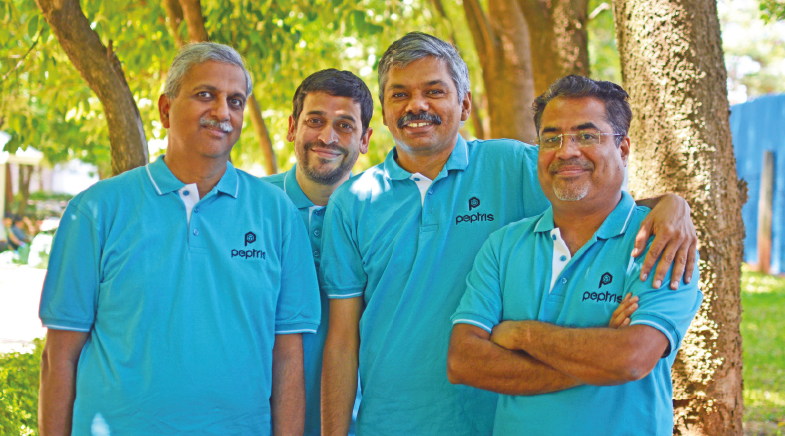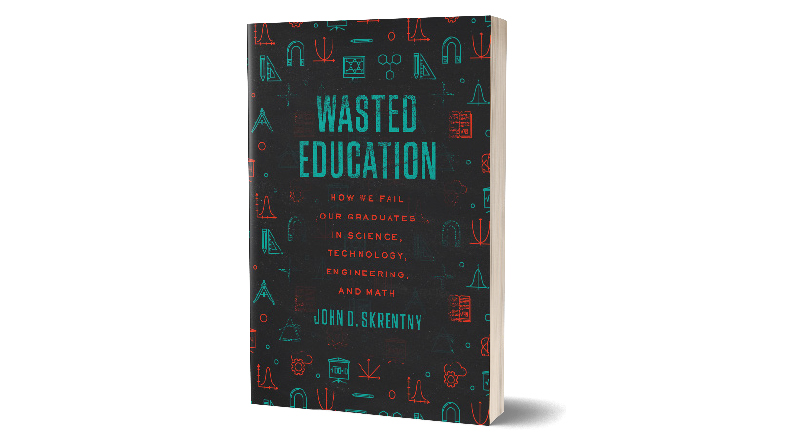For a better tomorrow
-
- from Shaastra :: vol 03 issue 04 :: May 2024

Start-ups harness AI to create novel hiring methods, biomolecules and drugs.
BABBLEBOTS.AI
Founders: Roli Gupta and Dhruv Jaglan
Year: 2022
Big idea: Using voice and GenAI to help companies conduct recruitment interviews
The work was getting extremely monotonous, Roli Gupta realised while dealing with sales and training at an ed-tech start-up in Mumbai. "We were doing the same thing, following up with candidates, and having the same conversation," she says. She conducted dozens of interviews and, by the end of the day, could barely recall whom she had spoken to and what they had said: everyone's background was similar, as were their responses.
So, Gupta thought of starting a venture that would do away with the tedium of such interviews. An engineering graduate from the Indian Institute of Technology (IIT) Bombay, with an MBA from the University of California, Berkeley, she founded Babblebots.ai with Dhruv Jaglan, also an IIT Bombay alumnus. Jaglan had worked as an engineer at LinkedIn, which made him aware of recruitment challenges.
Gupta had worked in the U.S. for a decade before returning to India. Her experience as an enterprise product manager helped her when she sought to use artificial intelligence (AI) and large language models (LLM) to build a voice AI venture that would conduct recruitment interviews for companies. The team was clear that the problem of repetitive questioning in the hiring process could not be solved with a chatbot option. Chatbots and exams or assessments do not give a candidate the feeling of being actually addressed, she says.
Incubated at the Society for Innovation and Entrepreneurship at IIT Bombay, Babblebots.ai has built a long-form voice conversation stack. She adds that it is like having a human-like conversation with a machine, which is a lot more nuanced than, say, a chatbot. "Can you have an open-ended conversation with a machine? We do consider Babblebots as a voice plus AI company… for recruitment," she says. The same technology stack will be used for other cases as well, Gupta adds.
The company's voice-AI layer will detect the nuances in an interview with a candidate and even ask follow-up queries rather than merely posing questions in a programmed order. The product understands the sentence, comprehends what is being said and, using LLM, continues with the conversation as if the interviewer were a person. "We build these micro-models and we use GenAI to drive a more insightful conversation," says Gupta. Babblebots uses inputs such as resumes, job descriptions and what candidates say to conduct the interview. The SaaS (Software as a Service) product is being marketed in India and may be launched internationally, too.
FERMBOX BIO
Founders: Subramani R. and Preeti Dharmagoudar
Year: 2022
Big idea: Leveraging precision fermentation to manufacture novel biomolecules
Textile engineer Subramani R. had extensive experience in researching and developing enzymes for diverse applications. After a stint in biopharma company Biocon, he started a venture to develop enzymes that would replace animal components in medicines and vaccines. He went on to set up Fermbox Bio, a synthetic biology research and manufacturing company, which uses precision fermentation to produce bio-based products. For this, he teamed up with his wife Preeti Dharmagoudar, who has a background in life sciences, and has had extensive experience in the pharma and nutrition fields.
Headquartered in Bengaluru, Fermbox Bio offers synthetic bio products, technology and scale-up solutions. It has opted for a collaborative approach with other players in the biotech field. "Our model is to be able to partner with different companies to develop products, to be able to build a plant with somebody and to be able to commercialise as well," Subramani says. He adds that the value it brings to the partnerships is technology development, manufacturing and commercialisation, ensuring that there is a steady revenue stream for the company.

In India, synthetic biology is an emerging field; it involves redesigning or re-engineering organisms so that they have new abilities and can be applied for various purposes. Fermbox Bio will make bio-materials that can replace supply chains that are dependent on petrochemicals or forest produce or animal compounds. Subramani cites the example of fragrances, which are made using petrochemicals or forest produce. Fermbox Bio uses synbio (synthetic biology) technology to develop an alternative that uses fermentation. Bio-materials are materials made in a fermenter using a biological organism. "We are building a product-agnostic, synthetic bio company. We are picking products which will be viable today and at the same time replacing materials from plants or animals or petrochemicals," he says.

The B2B venture's products will be in three broad segments: starting materials; colours, dyes and fragrances; and fats and lipids. It will focus on making ingredients; the products will be for global markets. The company's aim will be to 'make in India' or anywhere else in the world for the world, Subramani says.
Fermbox Bio has its molecular biology and bioprocess labs within the Bangalore Bioinnovation Centre and has a full-fledged research and development team. It will produce cellulose hydrolysing enzymes for Indian 2G ethanol manufacturing companies in a biomanufacturing plant in Thailand, to be built in collaboration with a Thai company. It is also setting up a lab in the U.S. The company has signed a partnership with two companies to produce cultivated meat in South-East Asia, Subramani adds.
PEPTRIS TECHNOLOGIES
Founders: Narayanan Venkatasubramanian, Shridhar Narayanan, Anand Budni and Amit Mahajan
Year: 2019
Big idea: Discovering new drugs and repurposing existing drugs with the help of AI
What happens when four people — three with data analytics expertise and the fourth with a background in pharmaceutical sciences — come together? They form a company that will use the power of artificial intelligence (AI) to discover drugs. That is the story of Shridhar Narayanan, who has been associated with drug discovery for over two decades, and data analytics experts Narayanan Venkatasubramanian, Anand Budni and Amit Mahajan.

Venkatasubramanian, Budni and Mahajan had worked together in consumer electronics giant Philips India and then as consultants. Shridhar, who has a PhD in Neuro-Pharmacology from The Ohio State University and a post-doctorate from UCLA in Neuropsychiatry, had worked on drug discovery in Indian pharmaceutical companies. The quartet formed Peptris Technologies to combine their expertise to see if they could use AI to discover novel drugs. Venkatasubramanian says: "If there is a hypothesis that says a particular protein is the cause for a particular disease or modulating a particular biological pathway will help a person get back to good health, we go after those parts... We do not discover targets, we work with targets which are well established and have proof of concept in animals and/or humans."
The quartet formed Peptris Technologies to combine their expertise to see if they could use AI for drug discovery.
The company specialises in small molecule therapies, which account for nearly 80% of all therapies that are approved as drugs. A small molecule — which typically has 20-50 different atoms — will interact with the target protein and either prevent it from doing its critical function or enhance it to function better. "In simple terms, we need to discover the small molecule that is best suited to accomplish the desired modulation," Venkatasubramanian says.
Over the years, there has been a lot of computing used and simulations done in drug discovery. Scientists are also aiming for 'Rational Drug Design', where instead of randomly attempting all possible chemical compounds and trying and matching them with proteins of interest, computational tools and simulations are done intelligently. This is where AI accelerates the process. "We have created unique representations for molecules with which we will be able to search ultra-large compound libraries faster," he says. The company is working on cancers, inflammations and rare diseases.
According to Shridhar, the amortised cost of identifying a Phase I-ready candidate could be up to $600 million, but Peptris will accomplish that at a cost that's 90-95% lower with the use of AI. Further, instead of taking up to seven years to get to that stage, Peptris hopes to achieve this in three or four years. Peptris will not manufacture the drugs, but will license them to pharmaceutical companies. The company's work has progressed the farthest on rare diseases and it hopes to start clinical trials before 2025-end.
Have a
story idea?
Tell us.
Do you have a recent research paper or an idea for a science/technology-themed article that you'd like to tell us about?
GET IN TOUCH














